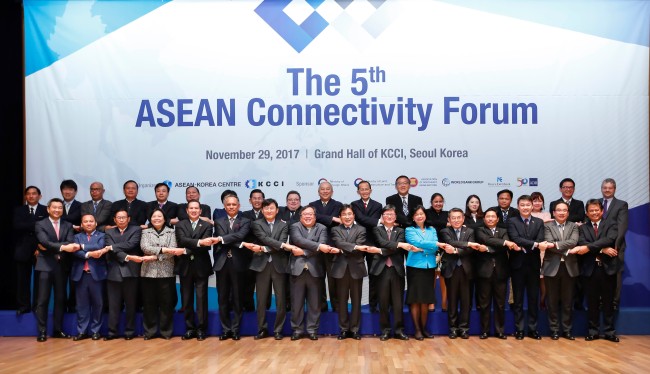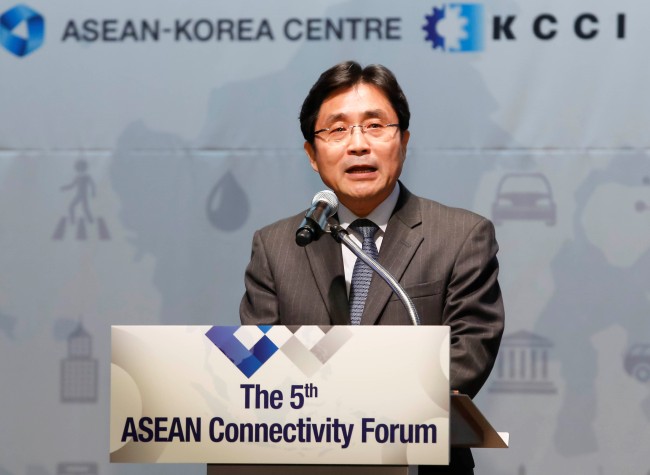ASEAN connectivity woos smart tech, infrastructure investments
By Joel LeePublished : Dec. 4, 2017 - 17:28
The Master Plan for ASEAN Connectivity 2025 blueprints a “seamlessly and comprehensively connected and integrated Association of Southeast Asian Nations that will promote competition, inclusiveness and a greater sense of community.”
Enhancing physical, institutional and social linkages across Southeast Asia is a priority of ASEAN governments, a goal shared and facilitated by Korea, which is pivoting toward the rising regional economic powerhouse.
As ASEAN generally suffers from a shortage and dilapidation of infrastructure, Korea’s expertise in industrial and infrastructural development comes in handy, particularly in the frontier fields of smart transportation, renewable energy and information and communication technology, industry experts said at the fifth ASEAN Connectivity Forum on Wednesday.
The event was jointly organized by the ASEAN-Korea Center and Korea Chamber of Commerce and Industry, and invited many high-level government officials, financial institution and corporate executives, scholars and journalists from ASEAN and Korea.
Enhancing physical, institutional and social linkages across Southeast Asia is a priority of ASEAN governments, a goal shared and facilitated by Korea, which is pivoting toward the rising regional economic powerhouse.
As ASEAN generally suffers from a shortage and dilapidation of infrastructure, Korea’s expertise in industrial and infrastructural development comes in handy, particularly in the frontier fields of smart transportation, renewable energy and information and communication technology, industry experts said at the fifth ASEAN Connectivity Forum on Wednesday.
The event was jointly organized by the ASEAN-Korea Center and Korea Chamber of Commerce and Industry, and invited many high-level government officials, financial institution and corporate executives, scholars and journalists from ASEAN and Korea.

Experts from multilateral development banks offered comprehensive overviews of financing and procurement through the public-private partnership arrangement; ASEAN government representatives presented the latest information on key connectivity-related projects; and Korean investors and ASEAN company representatives engaged in one-on-one business meetings.
“Recently, we have seen positive signs that global private capital is increasingly invested in developing countries’ infrastructure projects,” said Bambang Brodjonegoro, Indonesian minister of national development planning. “Multilateral development banks such as the World Bank, Asian Infrastructure Development Bank and Asian Development Bank, as well as government agencies of developing countries have assisted the PPP framework in most ASEAN countries, to attract more private sector and foreign investments in infrastructure projects.”
ASEAN needs $3.3 billion of investment in its transportation, water, energy and ICT infrastructures through 2030, the second-largest demand in the world after the Middle East, according to a report by McKinsey and Co. The region’s combined population of 670 million people and combined gross domestic product of $2.6 trillion present gigantic commercial opportunities, experts say.
“Korean President Moon Jae-in’s vision for a ‘future Korea-ASEAN community’ comprises people-to-people exchanges, security cooperation and economic collaboration, a goal ASEAN and Korea can pursue together,” said Yoon Soon-gu, Korea’s deputy foreign minister for political affairs. Seoul will provide an additional $100 million to its Global Infrastructure Fund for increased investment in ASEAN by 2022, he added.

Son Byeong-suk, Korea’s vice minister of land, infrastructure and transport, said the forum will help formulate different models of strategic collaboration between the two regions’ governments and companies, financial institutions and technical centers.
“I firmly believe that combining ASEAN’s boundless growth potential and the people’s passion for national development on one hand, with Korea’s experience, technology and financing on the other hand, would contribute greatly to both their economic growth,” said Son.
ASEAN is Korea’s second-largest trade partner and top investment destination, and the two sides are working to reach $200 billion in bilateral trade by 2020. Since the entry into force of the ASEAN-Korea Trade in Goods Agreement in June 2007, bilateral trade in goods has grown by 9.2 percent annually, reaching $125 billion last year and making Korea ASEAN’s fifth-largest trade partner.
“The Master Plan for ASEAN Connectivity 2025 targets five strategic areas of sustainable infrastructure, digital innovation, seamless logistics, regulatory excellence and people mobility,” said Ambassador Elizabeth P. Buensuceso, chair of the Committee of Permanent Representatives to ASEAN and ASEAN Connectivity Coordinating Committee.
“By 2025, we should like to have increased infrastructure investments, higher infrastructural productivity and more application of smart city models throughout ASEAN.”
By Joel Lee (joel@heraldcorp.com)











![[Kim Seong-kon] Democracy and the future of South Korea](http://res.heraldm.com/phpwas/restmb_idxmake.php?idx=644&simg=/content/image/2024/04/16/20240416050802_0.jpg&u=)







![[Today’s K-pop] BTS pop-up event to come to Seoul](http://res.heraldm.com/phpwas/restmb_idxmake.php?idx=642&simg=/content/image/2024/04/17/20240417050734_0.jpg&u=)